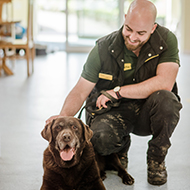
“Funding research is a vital part of the dog welfare jigsaw" - Paula Boyden, Dogs Trust.
Dogs Trust is offering research grants to academics working on projects that aim to positively impact dog welfare.
The charity's Canine Welfare Grants programme is seeking preliminary applications from researchers across the UK until 9 June 2022. Full details can be found at dogstrust.org.uk
Paula Boyden, veterinary director at Dogs Trust, said: “Funding research is a vital part of the dog welfare jigsaw, and Dogs Trust is very proud to be one of the key distributors of such funding in the UK. Over the years, the Canine Welfare Grant projects have had far reaching impacts on dog welfare, making huge differences to the lives of dogs."
There are two funding models for the scheme, including:
- the standard application model, welcoming applications from individual institutions and interdisciplinary groups
- the collaborative grants programme to encourage wider collaboration with Dogs Trust's internal research team.
Key areas for the standard and larger fund applications include:
1. Preventing problems in dogs developing or becoming a crisis. This could range from understanding and providing solutions for the genetic basis of disease, healthy ageing and understanding canine behaviour as it related to canine welfare.
2. Epidemiology of canine disease: Dogs Trust recognises the importance of data to underpin research into canine health and is looking for applications that will help to address the current dearth of information available, including those that use big data sets.
3. The welfare of dogs suffering from chronic disease*: Dogs Trust will accept applications that cover the spectrum of chronic diseases in dogs, including obesity and can include applications that help us understand the biology of important canine diseases and ways in which outcomes and quality of life can be improved.
Paula added: “There is a range of grants available from pump priming (up to £20,000), PhD (up to £100,000) and experienced investigator (up to £200,000). We are looking for applications with very clear pathways to impact with a focus on ‘healthspan’, the healthy lifespan of a dog.”



 The Veterinary Medicines Directorate (VMD) is inviting applications from veterinary students to attend a one-week extramural studies (EMS) placement in July 2026.
The Veterinary Medicines Directorate (VMD) is inviting applications from veterinary students to attend a one-week extramural studies (EMS) placement in July 2026.